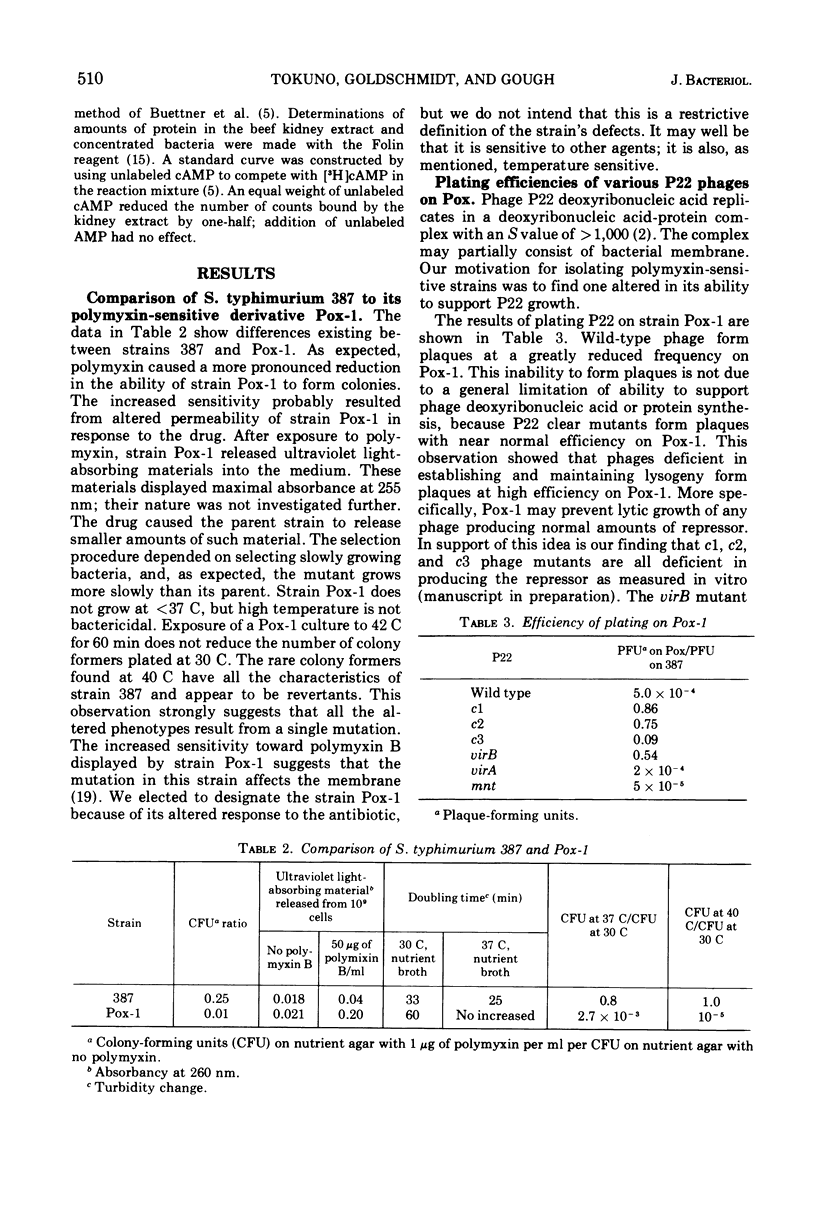Abstract
A slowly growing, polymyxin-sensitive mutant of Salmonella typhimurium was isolated. Wild-type phage P22 form plaques on the mutant at 5 × 10−4, the frequency observed on wild-type hosts. All P22 clear mutants form plaques with near normal frequency. The inability of the mutant to form plaques is correlated with an increase in lysogenization frequency. The cause of the increased lysogenization frequency is not known, but it is not the result of overproduction of cyclic adenosine 5′-monophosphate.
Full text
PDF





Selected References
These references are in PubMed. This may not be the complete list of references from this article.
- Belfort M., Wulff D. L. An analysis of the processes of infection and induction of E. coli mutant hfl-1 by bacteriophage lambda. Virology. 1973 Sep;55(1):183–192. doi: 10.1016/s0042-6822(73)81020-7. [DOI] [PubMed] [Google Scholar]
- Botstein D. Synthesis and maturation of phage P22 DNA. I. Identification of intermediates. J Mol Biol. 1968 Jun 28;34(3):621–641. doi: 10.1016/0022-2836(68)90185-x. [DOI] [PubMed] [Google Scholar]
- Bronson M. J., Levine M. Virulent mutants of bacteriophage p22.I. Isolation and genetic analysis. J Virol. 1971 May;7(5):559–568. doi: 10.1128/jvi.7.5.559-568.1971. [DOI] [PMC free article] [PubMed] [Google Scholar]
- Bronson M. J., Levine M. Virulent mutants of phage P22. II. Physiological analysis of P22 virB-3 and its component mutations. Virology. 1972 Mar;47(3):644–655. doi: 10.1016/0042-6822(72)90554-5. [DOI] [PubMed] [Google Scholar]
- Buettner M. J., Spitz E., Rickenberg H. V. Cyclic adenosine 3',5'-monophosphate in Escherichia coli. J Bacteriol. 1973 Jun;114(3):1068–1073. doi: 10.1128/jb.114.3.1068-1073.1973. [DOI] [PMC free article] [PubMed] [Google Scholar]
- Cheung W. Y. Cyclic 3'.5'-nucleotide phosphodiesterase. Effect of binding protein on the hydrolysis of cyclic AMP. Biochem Biophys Res Commun. 1972 Jan 14;46(1):99–105. doi: 10.1016/0006-291x(72)90635-3. [DOI] [PubMed] [Google Scholar]
- Dopatka H. D., Prell H. H. Amber mutants of Salmonella-phage P22 in genes engaged in the establishment of lysogeny. Mol Gen Genet. 1973 Jan 24;120(2):157–170. doi: 10.1007/BF00267244. [DOI] [PubMed] [Google Scholar]
- Echols H., Green L. Establishment and maintenance of repression by bacteriophage lambda: the role of the cI, cII, and c3 proteins. Proc Natl Acad Sci U S A. 1971 Sep;68(9):2190–2194. doi: 10.1073/pnas.68.9.2190. [DOI] [PMC free article] [PubMed] [Google Scholar]
- Gough M. Second locus of bacteriophage P22 necessary for the maintenance of lysogeny. J Virol. 1968 Oct;2(10):992–998. doi: 10.1128/jvi.2.10.992-998.1968. [DOI] [PMC free article] [PubMed] [Google Scholar]
- Grodzicker T., Arditti R. R., Eisen H. Establishment of repression by lambdoid phage in catabolite activator protein and adenylate cyclase mutants of Escherichia coli. Proc Natl Acad Sci U S A. 1972 Feb;69(2):366–370. doi: 10.1073/pnas.69.2.366. [DOI] [PMC free article] [PubMed] [Google Scholar]
- Hong J. S., Smith G. R., Ames B. N. Adenosine 3':5'-cyclic monophosphate concentration in the bacterial host regulates the viral decision between lysogeny and lysis. Proc Natl Acad Sci U S A. 1971 Sep;68(9):2258–2262. doi: 10.1073/pnas.68.9.2258. [DOI] [PMC free article] [PubMed] [Google Scholar]
- Jordan E., Green L., Echols H. Establishment of repression by bacteriophage lambda: lack of a direct regulatory effect of cyclic AMP. Virology. 1973 Oct;55(2):521–523. doi: 10.1016/0042-6822(73)90194-3. [DOI] [PubMed] [Google Scholar]
- LEVINE M. Mutations in the temperate phage P22 and lysogeny in Salmonella. Virology. 1957 Feb;3(1):22–41. doi: 10.1016/0042-6822(57)90021-1. [DOI] [PubMed] [Google Scholar]
- LEVINE M., SMITH H. O. SEQUENTIAL GENE ACTION IN THE ESTABLISHMENT OF LYSOGENY. Science. 1964 Dec 18;146(3651):1581–1582. doi: 10.1126/science.146.3651.1581. [DOI] [PubMed] [Google Scholar]
- LOWRY O. H., ROSEBROUGH N. J., FARR A. L., RANDALL R. J. Protein measurement with the Folin phenol reagent. J Biol Chem. 1951 Nov;193(1):265–275. [PubMed] [Google Scholar]
- Miyake T, Demerec M. Proline Mutants of Salmonella Typhimurium. Genetics. 1960 Jun;45(6):755–762. doi: 10.1093/genetics/45.6.755. [DOI] [PMC free article] [PubMed] [Google Scholar]
- NEWTON B. A. Reversal of the antibacterial activity of polymyxin by divalent cations. Nature. 1953 Jul 25;172(4369):160–161. [PubMed] [Google Scholar]
- NEWTON B. A. The properties and mode of action of the polymyxins. Bacteriol Rev. 1956 Mar;20(1):14–27. doi: 10.1128/br.20.1.14-27.1956. [DOI] [PMC free article] [PubMed] [Google Scholar]
- Nagel de Zwaig R., Luria S. E. Genetics and physiology of colicin-tolerant mutants of Escherichia coli. J Bacteriol. 1967 Oct;94(4):1112–1123. doi: 10.1128/jb.94.4.1112-1123.1967. [DOI] [PMC free article] [PubMed] [Google Scholar]
- Rolfe B., Schell J., Becker A., Heip J., Onodera K., Schell-Frederick E. A colicin-tolerant mutant of Escherichia coli with reduced levels of cyclic AMP and a strong bias towards lambda lysogeny. Mol Gen Genet. 1973 Jan 18;120(1):1–16. doi: 10.1007/BF00332980. [DOI] [PubMed] [Google Scholar]
- SMITH H. O., LEVINE M. TWO SEQUENTIAL REPRESSIONS OF DNA SYNTHESIS IN THE ESTABLISHMENT OF LYSOGENY BY PHAGE P22 AND ITS MUTANTS. Proc Natl Acad Sci U S A. 1964 Aug;52:356–363. doi: 10.1073/pnas.52.2.356. [DOI] [PMC free article] [PubMed] [Google Scholar]
- Smith H. O., Levine M. A phage P22 gene controlling integration of prophage. Virology. 1967 Feb;31(2):207–216. doi: 10.1016/0042-6822(67)90164-x. [DOI] [PubMed] [Google Scholar]
- ZINDER N. D. Lysogenization and superinfection immunity in Salmonella. Virology. 1958 Apr;5(2):291–326. doi: 10.1016/0042-6822(58)90025-4. [DOI] [PubMed] [Google Scholar]


